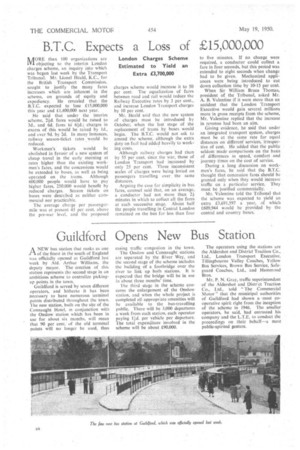B.T.C. Expects a Loss of i/15,000,000
Page 42

If you've noticed an error in this article please click here to report it so we can fix it.
London Charges Scheme Estimated to Yield an Extra 0,700,000 VLORE than 100 organizations are LV1 objecting to the interim London charges scheme. an inquiry into which was begun last week by the Transport Tribunal. Mr. Lionel Heald, K.C., for the British Transport Commission. sought to justify the many fares increases which are inherent in the scheme, on grounds of equity and expediency. He revealed that the B.T.C. expected to lose £15,000,000 this year and £1,400,000 next year.
He said that under the interim scheme, 20. fares would be raised to 3d., and 6d fares to 61d.; charges in excess of this would be raised by Id., and over 9d. by 2d. In many Instances, railway season-ticket rates would be reduced.
Workmen's tickets would be abolished in favotir of a new system of cheap travel in the early morning at rates higher than the existing workmen's fares, and the concessions would be extended to buses, as well as being operated on the trams. Although 600,000 people would have to pay higher fares, 250.000 would benefit by reduced charges. Season tickets on buses were described as neither commercial nor practicable.
The average charge per passengermile was at present 45 per cent, above the pre-war level, and the proposed charges scheme would increase it to 50 per cent. The equalization of fares between road and rail would reduce the Railway Executive rates by 3 per cent„ and increase London Transport Charges by 10 per cent.
Mr. Heald said that the new system of charges must be introduced by October. when the last stage of the replacement of trams by buses would begin. The B.T.C. would not ask te amend the scheme, although the extra duty.on fuel had added heaVily to working costs.
Although railway charges had risen by 55 per cent, since the war, those of London Transport had increased by only 25 per cent. Three inconsistent scales of chargeswere being -levied on passengers travelling over the same distances.
Arguing the case for simplicity in bus fares, counsel said that, on an average,a conductor had not more than 2i minutes in which to collect all the fares at each successive stage. About half the people travelling in Central London remained on the bus for less than four
to five minutes. If no change were required, a conductor could collect a fare in four seconds, but this period was extended to eight seconds when change had to be given. Mechanized appliances were being introduced to cut down collection time by 10-15 per cent.
When Sir William Bruce Thomas. president of the Tribunal, asked Mr. A. B. Valentine if it were more than an accident that the London Transport Executive would gain several millions more in gross receipts from the scheme, Mr. Valentine replied that the increase in revenue had been an aim.
Giving evidence, he said that under an integrated transport system, charges must be at the same rate for equal distances on differentservices, irrespective of cost. 1-10 added that the public seldom made comparisons on the basis of differences in speed,comfort and journey times on the cost of service.
During a long discussion on workmen's fares, he said that the B.T.C. thought that concession fares should be granted only when they would increase traffic on a particular service. They must be justified commercially.
Mr. Valentine told the Tribunal that the scheme was expected to yield an extra £3,691,597 a year, of which £609,944 would be provided by the central and country buses. •




























































































